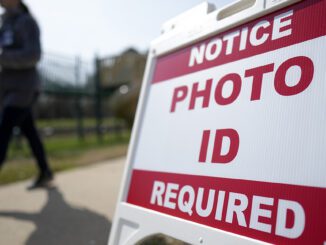
RALEIGH — A federal judge has declared North Carolina’s law that criminalizes felons voting as unconstitutional due to its “discriminatory” impact on black voters and lack of due process.
U.S. District Court Judge Loretta Biggs, an Obama administration appointee, struck down a law that made it a Class I felony for convicted felons to vote in N.C. elections.
“The Court holds that the Challenged Statute violates both the Equal Protection and Due Process Clauses of the Fourteenth Amendment,” wrote Biggs. “Therefore, Plaintiffs’ Motion for Summary Judgment will be granted.”
Biggs’ decision grants summary judgment to plaintiffs and permanently enjoins the enforcement of the challenged statute.
The ruling criticizes the law’s “historical” intent to exclude black voters, with Biggs writing it was enacted “with discriminatory intent” and “continues to disproportionately impact Black voters.” In her ruling, Biggs also underscored the idea the law could be “arbitrarily” enforced.
The law, NC General Statute 163-275(5), created a felony for convicted felons attempting to vote without restored rights.
Senate Bill 747, enacted in 2023 after a successful veto override, included language that felons could be charged with a felony if they knew their voting rights had not been restored.
Despite the changes in SB 747, Biggs still found it unconstitutional, and her ruling appears to agree with the plaintiffs’ arguments that the law obligated them to invest resources, time and money in advising felons about their voting rights.
This ruling does not affect another law, N.C. General Statute 13-1, which allows felons to vote under certain conditions such as being unconditionally discharged from prison, probation or parole, if the felon receives an unconditional pardon, or the felon fulfills all conditions of a conditional pardon.
Additionally, conditions for federal crimes include felons who are unconditionally discharged, receive an unconditional pardon or fulfill conditions of a conditional pardon. For crimes in other states, the felon must meet similar conditions previously listed in their respective state.
“The Court concludes that since the Challenged Statute permits voting upon restoration to the right of citizenship, it provides some type of ‘comprehensible normative standard’ and thus retains its constitutional core,” Biggs wrote.
This case follows a decision by the now Republican-majority N.C. Supreme Court that overruled a Court of Appeals panel and upheld only those felon voting restrictions tied to 13-1 under the state constitution. The prior Democratically controlled N.C. Supreme Court had taken the case away from the N.C. Court of Appeals in an attempt to fast-track it ahead of the 2022 November elections.

